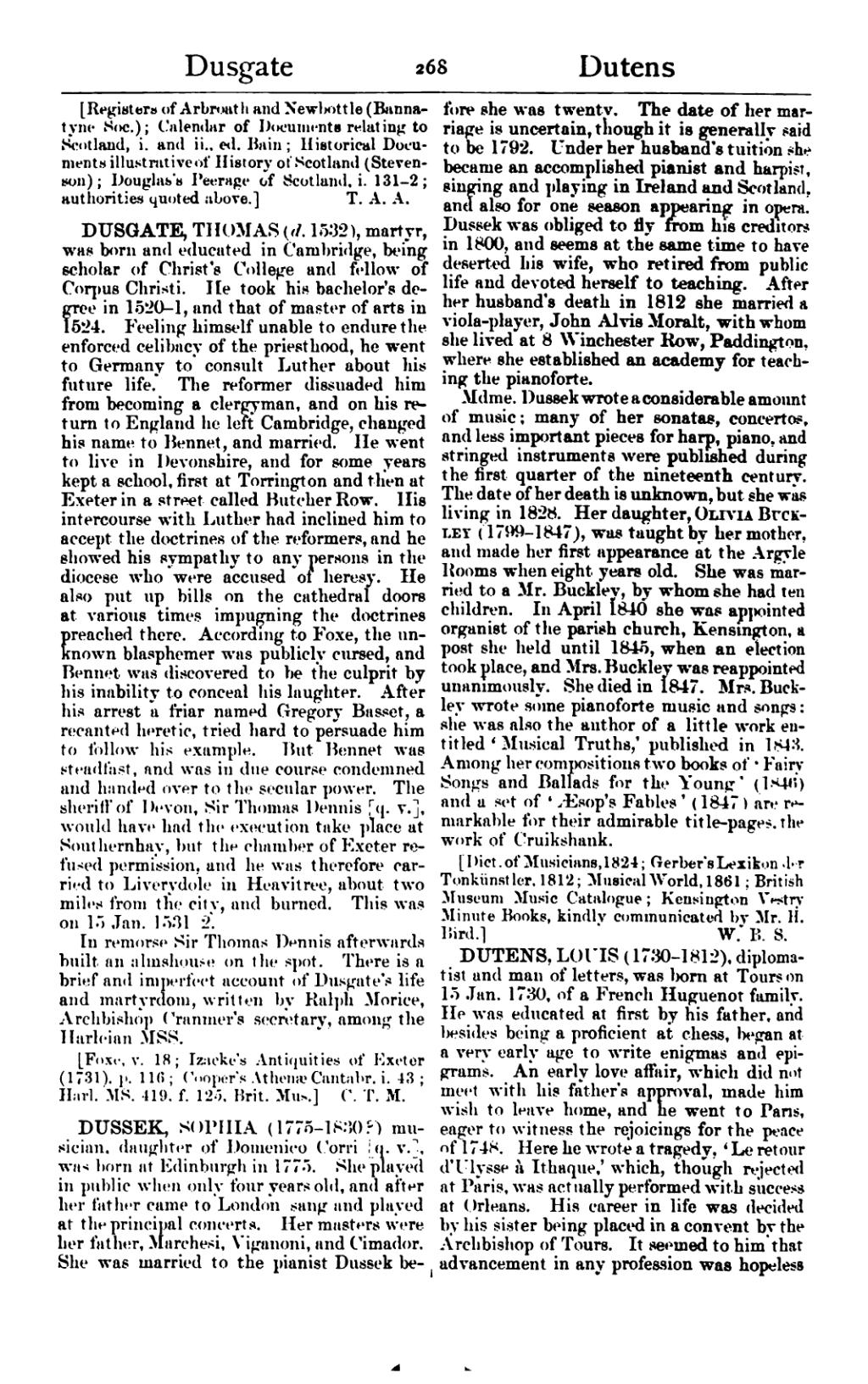[Registers of Arbroath and Newbottle (Bannatyne Soc.); Calendar of Documents relating to Scotland, i. and ii., ed. Bain; Historical Documents illustrative of History of Scotland (Stevenson); Douglas's Peerage of Scotland, i. 131–2; authorities quoted above.]
DUSGATE, THOMAS (d. 1532), martyr, was born and educated in Cambridge, being scholar of Christ's College and fellow of Corpus Christi. He took his bachelor's degree in 1520–1, and that of master of arts in 1524. Feeling himself unable to endure the enforced celibacy of the priesthood, he went to Germany to consult Luther about his future life. The reformer dissuaded him from becoming a clergyman, and on his return to England he left Cambridge, changed his name to Bennet, and married. He went to live in Devonshire, and for some years kept a school, first at Torrington and then at Exeter in a street called Butcher Row. His intercourse with Luther had inclined him to accept the doctrines of the reformers, and he showed his sympathy to any persons in the diocese who were accused of heresy. He also put up bills on the cathedral doors at various times impugning the doctrines preached there. According to Foxe, the unknown blasphemer was publicly cursed, and Bennet was discovered to be the culprit by his inability to conceal his laughter. After his arrest a friar named Gregory Basset, a recanted heretic, tried hard to persuade him to follow his example. But Bennet was steadfast, and was in due course condemned and handed over to the secular power. The sheriff of Devon, Sir Thomas Dennis [q. v.], would have had the execution take place at Southernhay, but the chamber of Exeter refused permission, and he was therefore carried to Liverydole in Heavitree, about two miles from the city, and burned. This was on 15 Jan. 1531–2.
In remorse Sir Thomas Dennis afterwards built an almshouse on the spot. There is a brief and imperfect account of Dusgate's life and martyrdom, written by Ralph Morice, Archbishop Cranmer's secretary, among the Harleian MSS.
[Foxe, v. 18; Izacke's Antiquities of Exeter (1731), p. 116; Cooper's Athenæ Cantabr. i. 43; Harl. MS. 419, f. 125, Brit. Mus.]
DUSSEK, SOPHIA (1775–1830?) musician, daughter of Domenico Corri [q. v.], was born at Edinburgh in 1775. She played in public when only four years old, and after her father came to London sang and played at the principal concerts. Her masters were her father, Marchesi, Viganoni, and Cimador. She was married to the pianist Dussek before she was twenty. The date of her marriage is uncertain, though it is generally said to be 1792. Under her husband's tuition she became an accomplished pianist and harpist, singing and playing in Ireland and Scotland, and also for one season appearing in opera. Dussek was obliged to fly from his creditors in 1800, and seems at the same time to have deserted his wife, who retired from public life and devoted herself to teaching. After her husband's death in 1812 she married a viola-player, John Alvis Moralt, with whom she lived at 8 Winchester Row, Paddington, where she established an academy for teaching the pianoforte.
Mdme. Dussek wrote a considerable amount of music; many of her sonatas, concertos, and less important pieces for harp, piano, and stringed instruments were published during the first quarter of the nineteenth century. The date of her death is unknown, but she was living in 1828. Her daughter, Olivia Buckley (1799–1847), was taught by her mother, and made her first appearance at the Argyle Rooms when eight years old. She was married to a Mr. Buckley, by whom she had ten children. In April 1840 she was appointed organist of the parish church, Kensington, a post she held until 1845, when an election took place, and Mrs. Buckley was reappointed unanimously. She died in 1847. Mrs. Buckley wrote some pianoforte music and songs; she was also the author of a little work entitled ‘Musical Truths,’ published in 1843. Among her compositions two books of ‘Fairy Songs and Ballads for the Young’ (1846) and a set of ‘Æsop's Fables’ (1847) are remarkable for their admirable title-pages, the work of Cruikshank.
[Dict. of Musicians, 1824; Gerber's Lexikon der Tonkünstler, 1812; Musical World, 1861; British Museum Music Catalogue; Kensington Vestry Minute Books, kindly communicated by Mr. H. Bird.]
DUTENS, LOUIS (1730–1812), diplomatist and man of letters, was born at Tours on 15 Jan. 1730, of a French Huguenot family. He was educated at first by his father, and besides being a proficient at chess, began at a very early age to write enigmas and epigrams. An early love affair, which did not meet with his father's approval, made him wish to leave home, and he went to Paris, eager to witness the rejoicings for the peace of 1748. Here he wrote a tragedy, ‘Le retour d'Ulysse à Ithaque,’ which, though rejected at Paris, was actually performed with success at Orleans. His career in life was decided by his sister being placed in a convent by the Archbishop of Tours. It seemed to him that advancement in any profession was hopeless
